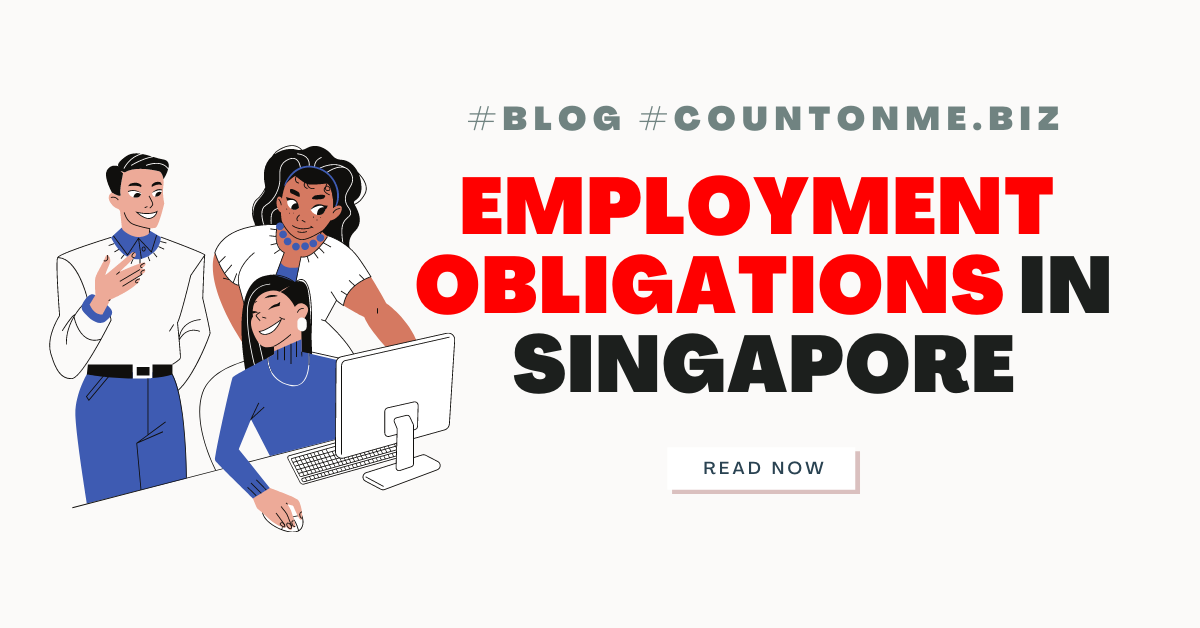What is the Employment Act?
The Employment Act is Singapore’s main labour law. It provides for the basic terms and conditions at work for employees covered by the Act.
The Employment Act of 1968 is Singapore’s primary labor legislation which governs the relations between the employer and the employees in an organization. The main purpose of the Act is to maintain good employment standards and safeguard working conditions for employees. The Act extends to the entire employment process, starting from the appointment up to an employee’s dismissal or termination.

Labour laws in Singapore are fair, efficient, and business-friendly. According to The Global Competitiveness Report 2015 – 2016, Singapore ranks #3 in the world for best labour-employer relations. Employment related regulations are an important area of legal compliance requirements that Singapore companies must follow. All businesses, in their capacity as an employer, need to comply with the employment laws when hiring, managing, and terminating employees.
It is important for an employer to decide the terms and conditions of an employment contract in accordance with the provisions of the employment law. This article will explain the key provisions of the Employment Act that an entrepreneur who is setting up a company in Singapore should be aware of.
Who is covered by the Act?

You are covered if you are an employee working under a contract of service with an employer.
It covers local and foreign employees.
An employee can be employed in the following terms:
- Full-time
- Part-time
- Temporary
- Contract
An employee can be paid on the following basis:
- Hourly
- Daily
- Monthly
- Piece-rated
If you work less than 35 hours a week, you are a part-time employee covered by the Employment of Part-Time Employees Regulations.
However, you are not covered if you are employed as a:
- Seafarer
- Domestic worker
- Statutory board employee or civil servant
The Key Provisions of the Act
The Employment Act guarantees certain benefits to employees. These benefits include annual paid leaves, sick leaves, maternity benefits, paid public holidays etc. Employers must ensure that they fulfil all such requirements in the Act and also draft the terms of the contract accordingly.
Specifically, employers must be compliant with the following provisions of the Act:
An employee must be at least 13 years of age to be eligible for employment. However, the age limit differs depending on the employee’s type of work. For instance, an employer cannot engage persons below the age of 16 years in any workplace with hazardous conditions that can be detrimental to the health of the person.
With respect to wages, the Act does not prescribe any minimum wage for employees. The wages are applicable according to the agreed terms between the employer and the employee.
The normal working hours of an employee are 8 hours a day up to a maximum of 44 hours a week. Additionally, no employee should work consecutively for 6 hours a day without any break. An employer must confirm the hours of work in the employment contract.
The work hours do not include break-time.
Note
This provision is applicable only to employees who earn a monthly salary not exceeding $2,500.
Besides the Employment Act, other pieces of legislation also affect the employment contract. The Child Development Co-Savings Act stipulates obligations on employers regarding maternity leave and maternity pay. The Central Provident Fund Act mandates that companies have to contribute to the CPF accounts of their employees. These are obligations that the employer cannot contract out of.
The Employment Act is the main legislation governing employment in Singapore, the common employment law also applies in various situations.
- Child Development Co-Savings Act
- Employment of Foreign Manpower Act
- Retirement and Re-employment Act
- Work Injury Compensation Act
- Workplace Safety and Health Act
Employment obligations: compulsory leave in Singapore
Every employer in Singapore has certain rights and responsibilities. When hiring new people, keep in mind that it is important to get the right skills and knowledge, but it is equally important to treat your new employees fairly and properly according to the law.
Each employee receives a salary, but each employee is entitled to benefits too. When it comes to these perks, they come in various types of compensation. Benefits have to be included along with the salary and can never exclude one another.
One mandatory benefit that all Singapore employees are entitled to is compulsory leave Singapore.
- Annual Leave
- Sick Leave
- Childcare leave
- Maternity Leave
- Paternity Leave
- Shared Parental Leave
- Paid Hospitalisation Leave
Can a company force you to take annual leave in Singapore?
Requiring employees to take their annual leave entitlements without their consent or forcing them to go on no-pay leave are both considered to be unreasonable practices. If an employer does this, their work pass privileges may be suspended.
If you encounter such practices at your place of employment, you should report them to the Ministry of Manpower (MOM), which will take appropriate actions against your employer.
Is compassionate leave compulsory in Singapore?
Singapore law doesn’t mandate compulsory compassionate leave and the Ministry of Manpower (MOM) states that there is no statutory entitlement for compassionate leave. However, most employers do provide compassionate leave whenever a family member of an employee passes away.
This type of leave depends solely on the employee’s employment contract or a mutual agreement the employee and employer made. If the employer agrees to provide compassionate leave, this can be done as either annual leave or unpaid leave.


